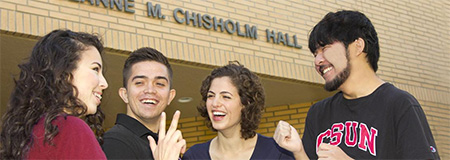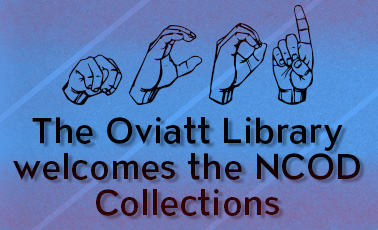June 27, 2016
 The Oviatt Library, the National Center on Deafness (NCOD), and the Department of Deaf Studies, Michael D. Eisner College of Education share CSUN’s commitment to student success by providing information resources, services, and instruction in support of the needs of a diverse regional population and beyond. Furthermore, all three entities are committed to forging partnerships and collaborations in support of this shared endeavor, and in particular, in recognizing the cultural significance of the rich and in many cases unique collections housed in the NCOD Resource Center, and providing for their preservation and increased access.
The Oviatt Library, the National Center on Deafness (NCOD), and the Department of Deaf Studies, Michael D. Eisner College of Education share CSUN’s commitment to student success by providing information resources, services, and instruction in support of the needs of a diverse regional population and beyond. Furthermore, all three entities are committed to forging partnerships and collaborations in support of this shared endeavor, and in particular, in recognizing the cultural significance of the rich and in many cases unique collections housed in the NCOD Resource Center, and providing for their preservation and increased access.
Background
The NCOD Resource Center was established in 1978 to house one of the nation's largest collections of deaf-related books, journals, theses and dissertations, videotapes, DVDs, CDs and archival documents. It is also known as the “Deaf Library” to students, faculty, and community members, both on and off campus. Currently, the collection consists of approximately 7,500 books, 2,100 VHS tapes, 1,200 DVDs, 891 volumes of periodicals, almost 200 CD-ROMS and other media, and approximately 50 feet of archival materials.
 Over the last three years, the current and former directors of the NCOD, the Chair of Deaf Studies, Student Affairs, and the Dean of the Library have been in various conversations about possible collaborations between the NCOD Resource Center and the Oviatt Library. Key to these discussions was moving the collections and staff to the Oviatt Library to allow the NCOD to make programmatic changes in its facility to accommodate other needed student services. For the Oviatt Library, this collaboration would consolidate and streamline a long-standing partnership between the two entities, which consists of the Oviatt Library providing support for the access of the collections, staffing, and services offered by the NCOD Resource Center.
Over the last three years, the current and former directors of the NCOD, the Chair of Deaf Studies, Student Affairs, and the Dean of the Library have been in various conversations about possible collaborations between the NCOD Resource Center and the Oviatt Library. Key to these discussions was moving the collections and staff to the Oviatt Library to allow the NCOD to make programmatic changes in its facility to accommodate other needed student services. For the Oviatt Library, this collaboration would consolidate and streamline a long-standing partnership between the two entities, which consists of the Oviatt Library providing support for the access of the collections, staffing, and services offered by the NCOD Resource Center.
Next Steps
We now have the opportunity to start a new chapter in the NCOD Resource Center, namely, by integrating the collections into the Oviatt Library and providing greater access to and preservation of these invaluable collections. While we recognize the rich history and importance of the NCOD Resource Center as both a cultural repository of information and ideas and as a vital community space, we are also confident that the integration of NCOD collections into the Oviatt’s existing collections will have many added benefits and mitigating factors, including the following:
- Books and other cataloged materials will be integrated into the Library of Congress call number system of shelving books, which is currently in use in the NCOD Library, which ensures that books on the same subject are shelved together. Based on their call numbers, books may be shelved on the 2nd, 3rd, or 4th floors. Given that approximately 78% of the NCOD collection would fall under call numbers shelved on the third floor, the majority of the collection will be kept together. This will also integrate the Oviatt Library’s books with the NCOD books on deaf studies and related disciplines, thus allowing researchers access to more resources for their research. Furthermore, integrating the two collections in the Oviatt Library will mean that researchers will only have one building to visit, not two, as is currently the case.
- Rare and archival materials will be preserved and housed in the Special Collections & Archives department, 2nd floor West Wing. This area has special security and temperature controlled environments to ensure the integrity and accessibility of these rare collections for years to come.
- Media will be accessible in the Music & Media department, 2nd floor, East Wing, which also has equipment and space for viewing the videos and DVDs.
- Furthermore, in terms of physical access to the collection, during the academic year, the Oviatt Library is open 85 hours per week. In addition, it offers extended hours during the week leading up to and including finals, is open over 50 hours per week in the summer, and is open most weekends. In contrast, the NCOD Library is only open 35 hours per week during the academic year, is closed on weekends, and closed in the summer.
Therefore, for the many reasons stated above, we view this collaboration as a positive move by increasing the preservation of and access to this nationally recognized collection, and integrating NCOD Resource Center collections and services with the Oviatt Library.
For further information:
Deaf Related Materials Collection
Catherine McLeod, Director, NCOD
catherine.mcleod@csun.edu
Mark Stover, Dean, Oviatt Library
mark.stover@csun.edu
Kathy Dabbour
Associate Dean, Oviatt Library
kathy.dabbour@csun.edu
Flavia Fleischer, Chair, Department of Deaf Studies
flavia.fleischer@csun.edu

